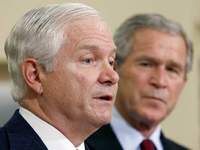Pentagon throws its head to Moscow to sound out possible attack against Russia
The position of the US Defense Secretary has gained even more diplomatic features during the recent years. The Pentagon’s head is supposed to observe the fulfillment of orders from Commander-in-Chief George W. Bush and win the support for the US-led foreign policies on the international arena. Defense Secretary Robert Gates does not avoid the diplomatic constituent of his job and travels all over the world in an attempt to promote the US military doctrine.

Robert Gates has become a frequent guest in Afghanistan and Iraq, where US soldiers are doing their best to prove that their native land can guarantee security to human civilization with the minimum of external assistance. Robert Gates has visited Moscow this week, which is an unusual point of destination for him. Gates arrived in the Kremlin to explain to the Russian administration that the US air defense system in Europe does not bring any damage to Russia's interests. Robert Gates has not been able to achieve the goal of his visit, though neither Russia nor the USA intend to cut the dialogue on the matter.
The Pentagon’s head had to answer rather uncomfortable questions about USA’s plans in the field of strategic nuclear arms. It is worthy of note that the START-1 (Strategic Arms Reduction Talks) Treaty expires in less than three years. Moscow has every reason to believe that Washington may not feel the need to sign any other restrictive documents and will use its economic predominance to leave Russia behind.
However, Russia will not lose the parity with the United States. First of all, Russia is a nuclear power, which automatically makes the USA respect the biggest country in the world. Secondly, Washington will launch the new arms race if it prefers not to burden itself with new international agreements. This is not going to be a bright perspective for Washington taking into consideration the budget deficits, the trade imbalance with China and global ambitions of the USA.
US congressmen are currently concerned with the state of affairs in the nuclear constituent of the US Armed Forces. However, there is a strong lack of finance for most important reforms in the field. It particularly goes about the recycling of old and the development of new warheads, the renewal of plans to deploy and apply the nuclear forces, etc. All of those initiatives entail considerable investments, but Republicans and Democrats can only conduct verbal discussions about the issues.
Yuri Baluyevsky, the chief of Russia’s General Staff, has recently stated that Russia will not spend its money to unfold its middle-range missile program to frighten Europe.
As for the fate of the US air defense system in Europe, Robert Gates invited Russian specialists to inspect the notorious subjects. Gates said at a press conference that the United States could understand Russia's concerns on the matter. One may assume that future generations of US weapons may undermine Russia’s strategic potential.
Politcom
Translated by Dmitry Sudakov
Pravda.ru
Subscribe to Pravda.Ru Telegram channel, Facebook, RSS!




